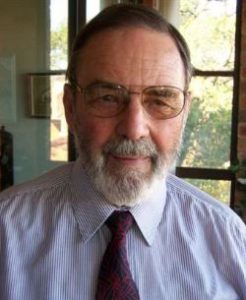An Energetic “90s” in the Field of Project Management
Interview with Alan Stretton
Project Management Pioneer
Life Fellow, Australian Institute of Project Management
Sydney, Australia

Interviewed by Yu Yanjuan
Journalist, Project Management Review: PMR (China)
International Correspondent, PM World Journal
Introduction to the interviewee
Alan Stretton is one of the pioneers of modern project management. He is currently a member of the Faculty Corps for the University of Management & Technology (UMT), USA. In 2006, he retired from a position as Adjunct Professor of Project Management in the Faculty of Design, Architecture and Building at the University of Technology, Sydney (UTS), Australia, which he joined in 1988 to develop and deliver a Master of Project Management program. Prior to joining UTS, Mr. Stretton worked in the building and construction industries in Australia, New Zealand and the USA for some 38 years, which included the project management of construction, R&D, introduction of information and control systems, internal management education programs and organizational change projects. He has degrees in Civil Engineering (BE, Tasmania) and Mathematics (MA, Oxford), and an honorary PhD in strategy, programme and project management (ESC, Lille, France). Alan was Chairman of the Standards (PMBOK) Committee of the Project Management Institute (PMI®) from late 1989 to early 1992. He held a similar position with the Australian Institute of Project Management (AIPM) and was elected a Life Fellow of AIPM in 1996. He was a member of the Core Working Group in the development of the Australian National Competency Standards for Project Management. He has published over 200 professional articles and papers.
Alan can be contacted at alanailene@bigpond.com.au .
Interview
Part I: Major changes of project management over 60 years
Q1. As one of the pioneers of modern project management, you must have witnessed major changes of this discipline over these years. Would you please share the major changes you’ve experienced?
Alan Stretton (Stretton): The discipline of project management has changed enormously in the past sixty years, and has grown and diversified to the point where I doubt if anyone can truly claim to have a comprehensive perspective of all its multiple dimensions. In my view, the growth and diversification have been evolutionary, and changes have arisen out of the cumulative contributions of countless numbers of project managers. So, I will respond to the above question by listing the many contributions and events which seem to me to have been most influential in facilitating so many changes over the past decades.
My own baseline is associated with my old employer, Civil & Civic (C&C), which developed its own approach to project management in the Australian building and construction industry in the 1950s and 60s.
At a more general level, I summarize my perceptions of the most significant changes in the project management world over the decades as follows.
- During the 1960s, the Australian construction industry was primarily concerned with using the CPM and PDM network planning techniques which were initially developed in the USA. (I introduced these into C&C in early 1962). However, in that decade few Australian companies followed the C&C route of undertaking undivided responsibility for managing project front-end phases as well as their execution.
- The 1970s appeared to me to be a decade in which project management consolidated in the construction and defence industries and began to be taken up by other industries. It also saw the formation of the Project Managers Forum in Australia, following the example of PMI in North America and IPMA’s predecessor in Europe in the previous decade.
- The 1980s saw substantial developments in a variety of contexts. Project management representative bodies moved to credential project managers. The Major Projects Association (MPA) was formed in the UK. Personal computers and project-related software packages started to make an impact. Early editions of the PMBOK and PRINCE were published. University courses in project management started to be rolled out. Overall, this decade saw both a consolidation, and an emergent broadening of perspectives, on what was entailed in managing projects.
- These developments continued apace in the 1990s. There was a proliferation of knowledge standards, competency baselines and the like, and accompanying project management credentialing procedures. Further issues such as project design and testing, simultaneous/concurrent engineering received increasing attention, along with how to manage non-conventional projects with high levels of initial uncertainty.
- The 2000s saw further developments in dealing with non-conventional projects, including Agile and more advanced risk management techniques. Dealing with complexity received greater attention, and Bent Flyvbjerg in particular drew increasing attention to major problems with complex mega-projects. Heightened interest and developments in program management were reflected in the publication of two important standards.
- Further developments in the 2010s included the deployment of virtual and dispersed project teams, increased attention to project portfolio management, to project / program contributions to strategic outcomes and benefits, and to other context-related issues.
Part II: Wishes for future project management
Q2. What do you wish project management would be like in the future? What do you want to say to newcomers in the field?
More…
To read entire interview, click here
Editor’s note: This interview was first published in PMR, Project Management Review magazine, China. It is republished here with the permission of PMR. The PM World Journal maintains a cooperative relationship with PMR, periodically republishing works from each other’s publications. To see the original interview with Chinese introduction, visit PMR at http://www.pmreview.com.cn/english/
How to cite this interview: PMR (2020). An Energetic “90s” in the Field of Project Management: Interview with Alan Stretton; Project Management Review; republished in the PM World Journal, Vol. IX, Issue IX, September. Available online at https://pmworldlibrary.net/wp-content/uploads/2020/09/pmwj97-Sep2020-Yanjuan-Interview-with-Alan-Stretton.pdf
About the Interviewer

Yu Yanjuan
Beijing, China
![]()
Yu Yanjuan (English name: Spring), Bachelor’s Degree, graduated from the English Department of Beijing International Studies University (BISU) in China. She is now an English-language journalist and editor working for Project Management Review (PMR) Magazine and website. She has interviewed over sixty top experts in the field of project management. Before joining PMR, she once worked as a journalist and editor for other media platforms in China. She has also worked part-time as an English teacher in training centers in Beijing. Beginning in January 2020, Spring also serves as an international correspondent for the PM World Journal.
For work contact, she can be reached via email yuyanjuan2005@163.com or LinkedIn https://www.linkedin.com/in/yanjuanyu-76b280151/.
To view other works by Spring, visit her author showcase in the PM World Library at https://pmworldlibrary.net/authors/yu-yanjuan/









